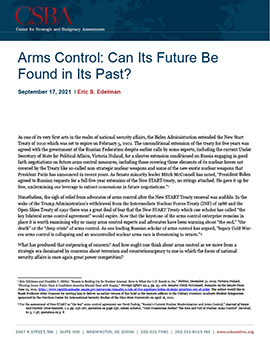
In the wake of the Trump Administration’s withdrawal from the Intermediate Nuclear Forces Treaty (INF) of 1988 and the Open Skies Treaty of 1992 there was a great deal of fear that the New START Treaty which one scholar has called “the key bilateral arms control agreement” would expire. Now that the keystone of the arms control enterprise remains in place it is worth examining why so many arms control experts and advocates have been warning about “the end,” “the death” or the “deep crisis” of arms control. As one leading Russian scholar of arms control has argued, “legacy Cold War-era arms control is collapsing and an uncontrolled nuclear arms race is threatening to return.”
What has produced that outpouring of concern? And how ought one think about arms control as we move from a strategic era dominated by concerns about terrorism and counterinsurgency to one in which the focus of national security affairs is once again great power competition?
Considering the United States' withdrawal from the Intermediate Nuclear Forces Treaty (INF) of 1988 and the Open Skies Treaty of 1992, arms control agreements have been surrounded by a great deal of uncertainty in recent years. Although the Biden Administration extended the New START Treaty as one of its first national security-related acts in office, the five-year extension did little to assuage the fears of arms control advocates.
In this study, Ambassador Eric Edelman explores the origins of these concerns, as well as how the shift from counterinsurgency to great power competition informs thinking about arms control. He finds these answers in the years of the late Cold War and early post-Cold War, which many arms control scholars consider "the golden era" of arms control. Analyzing these arms control agreements, and especially the negotiations surrounding them, Edelman predicts what the next era of arms control will look like. He also offers suggestions to ensure the mistakes of the past are not repeated, drawing upon the history of these negotiations and how scholars at the time predicted they would affect the sphere of arms control.



























